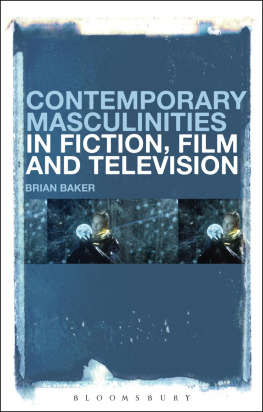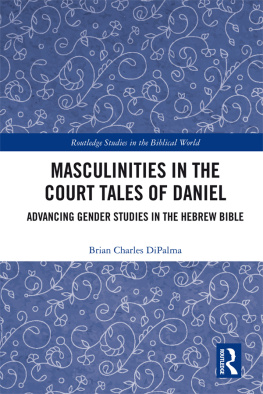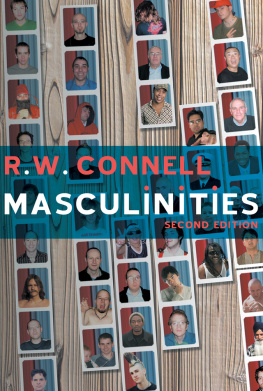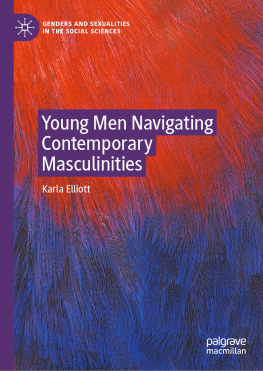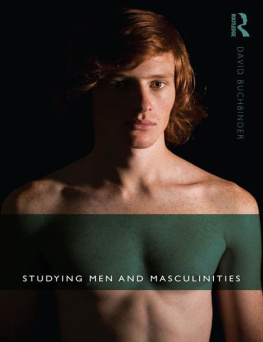Baker Brian - Contemporary Masculinities in Fiction, Film and Television
Here you can read online Baker Brian - Contemporary Masculinities in Fiction, Film and Television full text of the book (entire story) in english for free. Download pdf and epub, get meaning, cover and reviews about this ebook. year: 2019, publisher: Bloomsbury Academic & Professional, genre: Romance novel. Description of the work, (preface) as well as reviews are available. Best literature library LitArk.com created for fans of good reading and offers a wide selection of genres:
Romance novel
Science fiction
Adventure
Detective
Science
History
Home and family
Prose
Art
Politics
Computer
Non-fiction
Religion
Business
Children
Humor
Choose a favorite category and find really read worthwhile books. Enjoy immersion in the world of imagination, feel the emotions of the characters or learn something new for yourself, make an fascinating discovery.
- Book:Contemporary Masculinities in Fiction, Film and Television
- Author:
- Publisher:Bloomsbury Academic & Professional
- Genre:
- Year:2019
- Rating:3 / 5
- Favourites:Add to favourites
- Your mark:
- 60
- 1
- 2
- 3
- 4
- 5
Contemporary Masculinities in Fiction, Film and Television: summary, description and annotation
We offer to read an annotation, description, summary or preface (depends on what the author of the book "Contemporary Masculinities in Fiction, Film and Television" wrote himself). If you haven't found the necessary information about the book — write in the comments, we will try to find it.
Baker Brian: author's other books
Who wrote Contemporary Masculinities in Fiction, Film and Television? Find out the surname, the name of the author of the book and a list of all author's works by series.
Contemporary Masculinities in Fiction, Film and Television — read online for free the complete book (whole text) full work
Below is the text of the book, divided by pages. System saving the place of the last page read, allows you to conveniently read the book "Contemporary Masculinities in Fiction, Film and Television" online for free, without having to search again every time where you left off. Put a bookmark, and you can go to the page where you finished reading at any time.
Font size:
Interval:
Bookmark:
Contemporary Masculinities in Fiction, Film and Television
Contemporary Masculinities in Fiction, Film and Television
Brian Baker
Bloomsbury Academic
An imprint of Bloomsbury Publishing Inc

Bloomsbury Academic
An imprint of Bloomsbury Publishing Inc
| 1385 Broadway | 50 Bedford Square |
| New York | London |
| NY 10018 | WC1B 3DP |
| USA | UK |
www.bloomsbury.com
BLOOMSBURY and the Diana logo are trademarks of Bloomsbury Publishing Plc
First published 2015
Brian Baker, 2015
All rights reserved. No part of this publication may be reproduced or transmitted in any form or by any means, electronic or mechanical, including photocopying, recording, or any information storage or retrieval system, without prior permission in writing from the publishers.
No responsibility for loss caused to any individual or organization acting on or refraining from action as a result of the material in this publication can be accepted by Bloomsbury or the author.
Library of Congress Cataloging-in-Publication Data
Baker, Brian, 1969
Contemporary masculinities in fiction, film and television/
Brian Baker.
pages cm
Includes bibliographical references and index.
ISBN 978-1-62356-747-7 (hardback: alk. paper) 1. Masculinity in motion pictures. 2. Men in motion pictures. 3. Masculinity on television. 4. English fiction20th centuryHistory and criticism. 5. American fiction20th centuryHistory and criticism. 6. Masculinity in literature. 7. Men in literature. I. Title.
PN1995.9.M34B33 2015
820.935211dc23
2014033054
ISBN: HB: 978-1-6235-6747-7
ePDF: 978-1-6235-6922-8
ePUB: 978-1-6235-6738-5
Typeset by Deanta Global Publishing Services, Chennai, India
Contents
Although the writing of a book can be a frustratingly isolated and isolating experience, and not only for oneself, the process cannot take place without the help and support of others. Personally, I would like to thank Katie Gallof of Bloomsbury Academic for her ongoing enthusiasm and support for this project, and Mary Al-Sayed for her diligence and professionalism; friends and colleagues with whom I have discussed the ideas and texts, and who have provided me with inspiration and a helping hand at key moments, in particular, Andrew Tate, Arthur Bradley, John Schad, Catherine Spooner, Chris Witter, Fred Botting, Bruce Bennett, Amit Thakkar, Nick Hodgin and Lindsey King; and colleagues at Lancaster University, Keele University, the University of Mainz at Germersheim, the University of Chester and the Gladstone Library at Hawarden, where parts of this book were first tried out as seminar papers and at conferences.
Parts of this book have previously been published, and I would like to acknowledge the following for their permission to reprint this material in a different form. Chapter 1, from Revisioning 007: James Bond and Casino Royale , by Christoph Lindner (ed.), Copyright 2010 Columbia University Press, Reprinted with permission of the publisher. Part of Chapter 8, from Textual Revisions: Literature and Film , Brian Baker (ed.), Copyright 2009 The University of Chester Press, Reprinted with permission of the publisher. Chapter 10 was published, in altered form, as Tape Spectra in The Irish Journal of Gothic and Horror Studies , issue 11. Elements of Chapter 12, from The Routledge Companion to Gothic , by Catherine Spooner and Emma McEvoy (eds.), Copyright 2007 Routledge, and The Lure of the Dark Side: Satan and Demonology in Popular Culture by Christopher Partridge and Eric S. Christianson (eds.), Copyright 2009 Equinox/Routledge, Reprinted with permission of the publisher.
Finally, I must offer my deepest gratitude and appreciation to my wife Deniz and my daughters Isobel and Sophie, who have put up with the negative effects of the writing of this book with patience and kindness, and without which it would not exist.
This book developed from my growing critical interest in the intersection of representations of gender, in particular, masculinities, and the burgeoning field in sociology known as mobility studies, of which there is a leading research centre at my own institution, Lancaster University, which is led by John Urry. Although my project has since gone beyond the conceptual frame of mobilities, strong traces of it can be found everywhere in this book, especially in the work of Tim Cresswell and John Urry, in the attempt to think through constructions of hegemonic masculinity (the dominant within Anglo-American cultural representation) in an increasingly mobile, networked and globalized society. In this, my approach is not instrumental or neutral with regard to the impact of enhanced mobility upon masculinity; as will become apparent in the course of this book, my reading of contemporary masculinities (since 2000, but largely in the era of the War on Terror that followed 11 September 2001) is one that is informed by discourses of trauma, pathology and dislocation (in time and space). In short, across the range of different genre texts I look at in this book, masculinity is troubled, anxious, fissured, unable to cope with the alienating dynamics of contemporary globalized capitalism. In my previous book, Masculinities in Fiction and Film 19452000 , I discussed the crisis of masculinity that became culturally prominent at the very end of the 1990s, and particularly visible in films such as Fight Club (1999) and American Beauty (1999), as well as in a variety of publications, from newspaper articles to academic discourse. In a sense, the crisis has become the new hegemon, in that the dominance of neoliberal economics in the global North, crises of legitimacy in democratic political processes, the experience of war and the effects of terrorism, as well as emergent social and cultural formations produced by digital networks and globalized travel, have all shifted the ground for representations of masculinity, particularly white (hegemonic) masculinity, produced by the capitalist democracies of Europe and North America.
T his story is, of course, as old as modernity itself. Sigmund Freud, in Beyond the Pleasure Principle (1920), to which I will return (most appropriately) at key points in this book, proposes that the human psychic apparatus develops a kind of shield to ward off the shocks (in a physical sense, as well as the psychological and cultural one theorized by Walter Benjamin) of modern life. Although my approach is not strictly Freudian, I will make recurrent use of the discourses o f trauma and its relation to cultural works (literature, film, television), some of which are Freudian in origin. The traumatized male subject has become a recognizable figure across a range of cultural representations in the United States and United Kingdom, concretized in the figure of the veteran or a soldier suffering from Post-Traumatic Stress Disorder. The representation of the traumatized soldier has long historical roots, of course, back to the aftermath of World War I, which through texts such as Pat Barkers Regeneration (1992) have remained current through wars in Vietnam, and more recently in Iraq and Afghanistan . The first four chapters of this book negotiate with the figure of the damaged soldier, and the modulation of secret agent narrative and figures such as James Bond and Jason Bourne through trauma and loss. The hyper-mobility I diagnose in relation to both these agents is, I propose, directly connected to an extension of military intelligence-gathering power of the United States and United Kingdom across global spaces and boundaries, recurrent motifs in contemporary cinema. These chapters will also investigate the connection between masculinity and a new Imperium, as well as draw on counter-currents with regard to hegemonic and damaged masculinities, from the naval novels of Patrick OBrian (and their film adaptation) to the film Four Lions , a black comedy about British Muslims who have been radicalized and attempt suicide bombings.
Next pageFont size:
Interval:
Bookmark:
Similar books «Contemporary Masculinities in Fiction, Film and Television»
Look at similar books to Contemporary Masculinities in Fiction, Film and Television. We have selected literature similar in name and meaning in the hope of providing readers with more options to find new, interesting, not yet read works.
Discussion, reviews of the book Contemporary Masculinities in Fiction, Film and Television and just readers' own opinions. Leave your comments, write what you think about the work, its meaning or the main characters. Specify what exactly you liked and what you didn't like, and why you think so.

